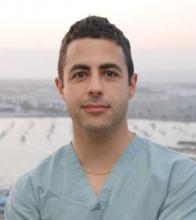Doctors have been conjecturing about how the new Apple Watch, with its spectacular fitness and wellness tracking features, will transform health care. The real rock star at Apple’s March 9 “Spring Forward” event, however, was the opening band, ResearchKit.
What is it?
ResearchKit is Apple’s (beautiful) solution to one of the great problems of medical research: recruiting subjects. ResearchKit allows researchers to collect data in a way that before today was impossible: with just a click from their smartphones. The open-source software platform allows developers to design studies and to recruit subjects right from the app store. Researchers can leverage high-tech smartphone sensors and can push out surveys, collecting both objective and subjective data from thousands (heck, potentially millions) of participants.
Five apps were developed for the launch: mPower for Parkinson’s disease, from the University of Rochester, N.Y.; GlucoSuccess for diabetes, from Massachusetts General Hospital, Boston; MyHeart Counts for cardiovascular disease, from Stanford (Calif.) University and the University of Oxford, England; Asthma Health from Mount Sinai and Weill Medical College of Cornell University, New York, N.Y.; and Share the Journey for breast cancer, from the Dana-Farber Cancer Institute, Boston; the University of California, Los Angeles Fielding School of Public Health; and Penn Medicine, Philadelphia.
My take
I took a closer look at MyHeart Counts, which evaluates how patients’ activity levels influence their cardiovascular health. According to Stanford University, a mere 4 days after its release, the MyHeart Counts app had been downloaded 52,900 times in the United States and Canada and had more than 22,000 users who had consented to the study. Try getting that kind of response to your research study with a flyer with tear-off phone number posted in your hospital cafeteria.
I was impressed with its beautiful interface and ease of use. Designed to gather sensor and health data from your iPhone and personal devices, this app is designed to help researchers (and you) detect patterns or details about your heart health. To start, you download the app, give your consent, answer questions about your health and lifestyle, and begin recording your activity with your phone or wearable device. You do a walk test to determine your heart health and potential health risk.
What happens to the data you input? It is sent (with your permission) to a secure database, and your name is replaced with a random code. Your coded and encrypted data are then shared with scientists and physicians to use in medical research.
For this particular study, they ask you to participate 10-15 minutes per day for 1 week, then hope that you can contribute further for 1 week every 3 months answering surveys about your health, lifestyle, and physical activity. Apple reassures users that they can withdraw at any time.
Why? Who cares?
The value proposition for researchers is obvious: The platform provides access to many more subjects than even imaginable. The accelerometer, barometer, gyroscope, and GPS send interesting data to researchers friction free. The Parkinson’s app, for example, uses a cool algorithm and the phone’s microphone to detect symptoms by having patients say “ahhhh.” By pushing out questionnaires regularly, you can collect much more data with shorter intervals for longer periods of time.
The advantages for patients are equally compelling. In addition to sending their data to researchers, they also receive information back from the researchers, helping them monitor their cardiovascular health. In fact, just knowing they are participating in the study might be of benefit. As dermatologist Dr. Steve Feldman of Wake Forest Baptist Medical Center, Winston Salem, N.C., has shown, patients are more likely to adhere to therapies when they know they are being watched, a manifestation of the Hawthorne effect.
Shortcomings
Surely there is a catch? And there is. With potentially millions of participants sending self-reported data, there is the potential that ResearchKit studies glean big, beautiful, bad data. How, for example, could you verify that self-reported asthma patients actually have asthma? Maybe they just read about ResearchKit and wanted to be part of the fun.
For patients, privacy concerns are paramount. Apple promised that no one, not even Apple, will see your data without your permission. But with privacy breaches reported in the news weekly, what can Apple’s assurance mean? Didn’t Target and Aetna promise to keep your data safe as well?
The potential for interesting research is enormous. By the time you read this, I wouldn’t be surprised if a psoriasis study had already launched. In fact, a year from now, the problem might be a dozen or more interesting psoriasis studies all competing for the same patients. Ah, maybe we should be glad if we should be so lucky.


